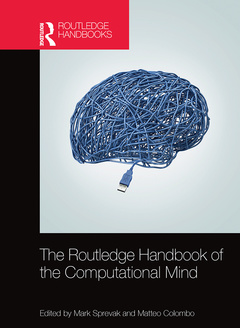Description
The Routledge Handbook of the Computational Mind
Routledge Handbooks in Philosophy Series
Coordinators: Sprevak Mark, Colombo Matteo
Language: English
Subjects for The Routledge Handbook of the Computational Mind:
Keywords
Turing Machine; Computational Explanation; computational; Computational Neuroscience; computation; Computational Cognitive Science; philosophy of mind; RPE; connectionism; Algorithmic Level; explanation; Computational Cognitive Models; reduction; Computational Theories; simulation; Prediction Error; frame problem; Computational Mind; enactivism; Vice Versa; neural coding; Blue Brain Project; neuroscience; Physical Symbol Systems Hypothesis; brain; PEM; consciousness; Particle Filtering Algorithm; vision; Bayesian Conditionalization; emotion; Computational Accounts; social cognition; Cybernetics Movement; motor; Task Irrelevant Dimensions; artificial intelligence; Spike Train; Turing; Universal Turing Machine; Churchland; Connectionist Models; skill; Al Haytham; Matteo Colombo; Ibn Al Haytham; Alistair M; C; Isaac; Extensional Adequacy; Diane Proudfoot; Jack Copeland; Joe Dewhurst; Tara H; Abraham; Kenneth Aizawa; Cameron Buckner; James Garson; Murray Shanahan; Richard Samuels; Catherine Stinson; Frank Faries; Anthony Chemero; David Danks; Jakob Hohwy; J; Brendan Ritchie; Gualtiero Piccinini; Lotem Elber-Dorozko; Oron Shagrir; Daniel A; Weiskopf; Clark Glymour; Ruben Sanchez-Romero; Frances Egan; William Ramsey; Daniel D; Hutto; Erik Myin; Anco Peeters; Farid Zahnoun; Rosa Cao; Colin Klein; Jenelle Salisbury; Susan Schneider; Marcin Miłkowski; Jakub Szymanik; Rineke Verbrugge; Carlos Zednik; Liz Irvine; Mazviita Chirimuuta; Nico Orlandi; Michael Rescorla; Xiaosi Gu; Stefan Brugger; Matthew Broome; John Michael; Miles MacLeod; Bryce Huebner; Joseph Jebari
Publication date: 12-2020
· 17.4x24.6 cm · Paperback
Publication date: 08-2018
· 17.4x24.6 cm · Hardback
Description
/li>Contents
/li>Readership
/li>Biography
/li>
Computational approaches dominate contemporary cognitive science, promising a unified, scientific explanation of how the mind works. However, computational approaches raise major philosophical and scientific questions. In what sense is the mind computational? How do computational approaches explain perception, learning, and decision making? What kinds of challenges should computational approaches overcome to advance our understanding of mind, brain, and behaviour?
The Routledge Handbook of the Computational Mind is an outstanding overview and exploration of these issues and the first philosophical collection of its kind. Comprising thirty-five chapters by an international team of contributors from different disciplines, the Handbook is organised into four parts:
- History and future prospects of computational approaches
- Types of computational approach
- Foundations and challenges of computational approaches
- Applications to specific parts of psychology.
Essential reading for students and researchers in philosophy of mind, philosophy of psychology, and philosophy of science, The Routledge Handbook of the Computational Mind will also be of interest to those studying computational models in related subjects such as psychology, neuroscience, and computer science.
Introduction Mark Sprevak and Matteo Colombo Part 1: History and Future Directions 1. Computational thought from Descartes to Lovelace Alistair M.C. Isaac 2. Turing and the first electronic brains: What the papers said Diane Proudfoot and Jack Copeland 3. British cybernetics Joe Dewhurst 4. Cybernetics Tara H. Abraham 5. Turing-equivalent computation at the "conception" of cognitive science Kenneth Aizawa 6. Connectionism and post-connectionist models Cameron Buckner and James Garson 7. Artificial Intelligence Murray Shanahan Part 2: Types of Computing 8. Classical computational models Richard Samuels 9. Explanation and connectionist models Catherine Stinson 10. Dynamic information processing Frank Faries and Anthony Chemero 11. Probabilistic models David Danks 12. Prediction error minimization in the brain Jakob Hohwy Part 3: Foundations and Challenges 13. Triviality arguments about computational implementation Mark Sprevak 14. Computational implementation J. Brendan Ritchie and Gualtiero Piccinini 15. Computation and levels in cognitive and neural sciences Lotem Elber-Dorozko and Oron Shagrir 16. Reductive explanation between psychology and neuroscience Daniel A. Weiskopf 17. Helmholtz’s vision: Underdetermination, behavior and the brain Clark Glymour and Ruben Sanchez-Romero 18. The nature and function of content in computational models Frances Egan 19. Maps, models and computational simulations in the mind William Ramsey 20. The cognitive basis of computation: Putting computation in its place Daniel D. Hutto, Erik Myin, Anco Peeters and Farid Zahnoun 21. Computational explanations and neural coding Rosa Cao 22. Computation, consciousness, and "Computation and consciousness" Colin Klein 23. Concepts, symbols and computation: An integrative approach Jenelle Salisbury and Susan Schneider 24. Embodied cognition Marcin Miłkowski 25. Tractability and the computational mind Jakub Szymanik and Rineke Verbrugge Part 4: Applications 26. Computational cognitive neuroscience Carlos Zednik 27. Simulation in computational neuroscience Liz Irvine 28. Learning and reasoning Matteo Colombo 29. Vision Mazviita Chirimuuta 30. Perception without computation? Nico Orlandi 31. Motor computation Michael Rescorla 32. Computational models of emotion Xiaosi Gu 33. Computational psychiatry Stefan Brugger and Matthew Broome 34. Computational approaches to social cognition John Michael and Miles MacLeod 35. Computational theories of group behavior Bryce Huebner and Joseph Jebari. Index
Mark Sprevak is a Senior Lecturer in Philosophy at the University of Edinburgh, UK. His book The Computational Mind is forthcoming from Routledge.
Matteo Colombo is an Assistant Professor at the Tilburg Center for Logic, Ethics, and Philosophy of Science, Tilburg University, The Netherlands; and a Humboldt Research Fellow at the Clinic for Psychiatry and Psychotherapy, Charité University Clinic Berlin, Germany.




